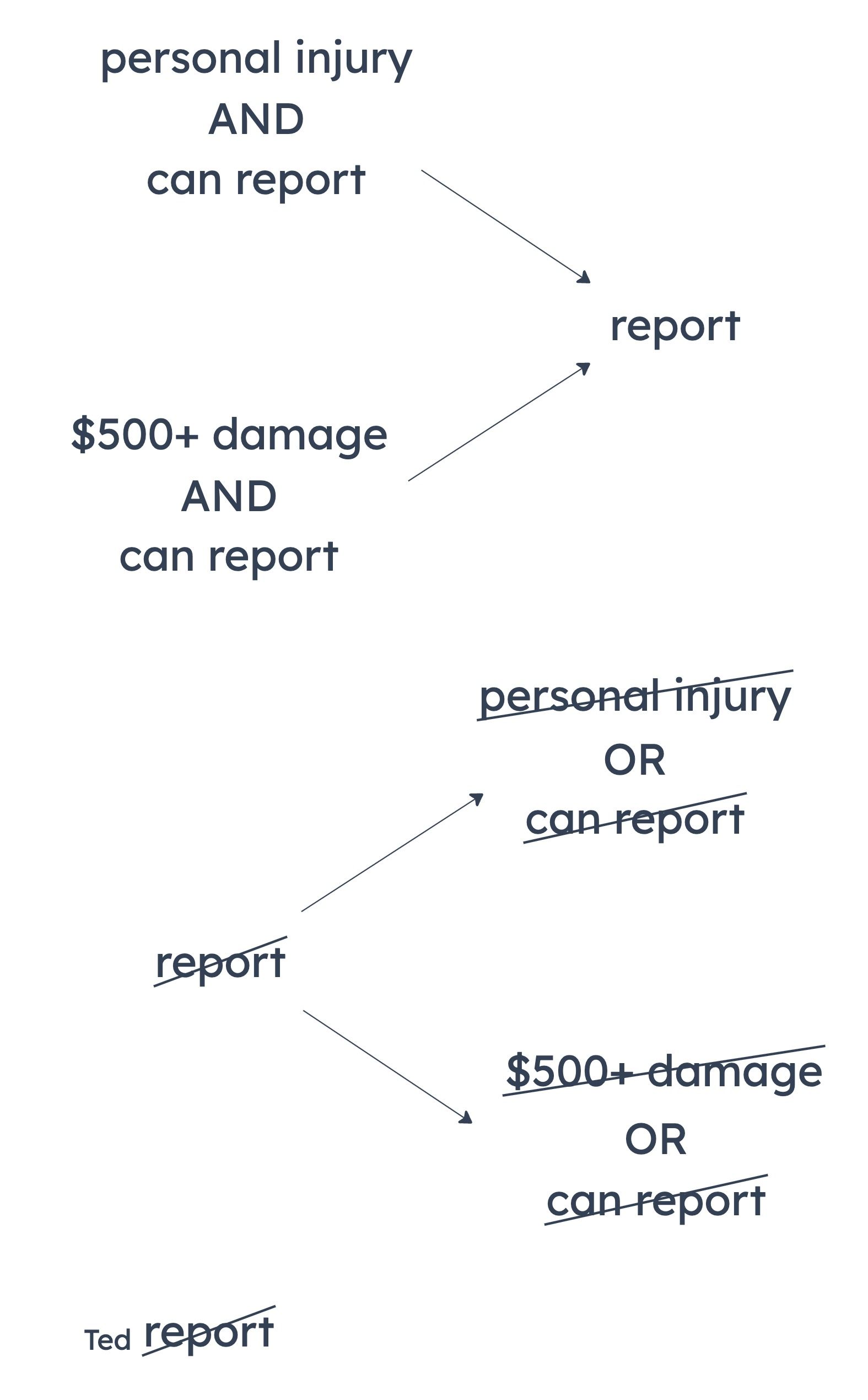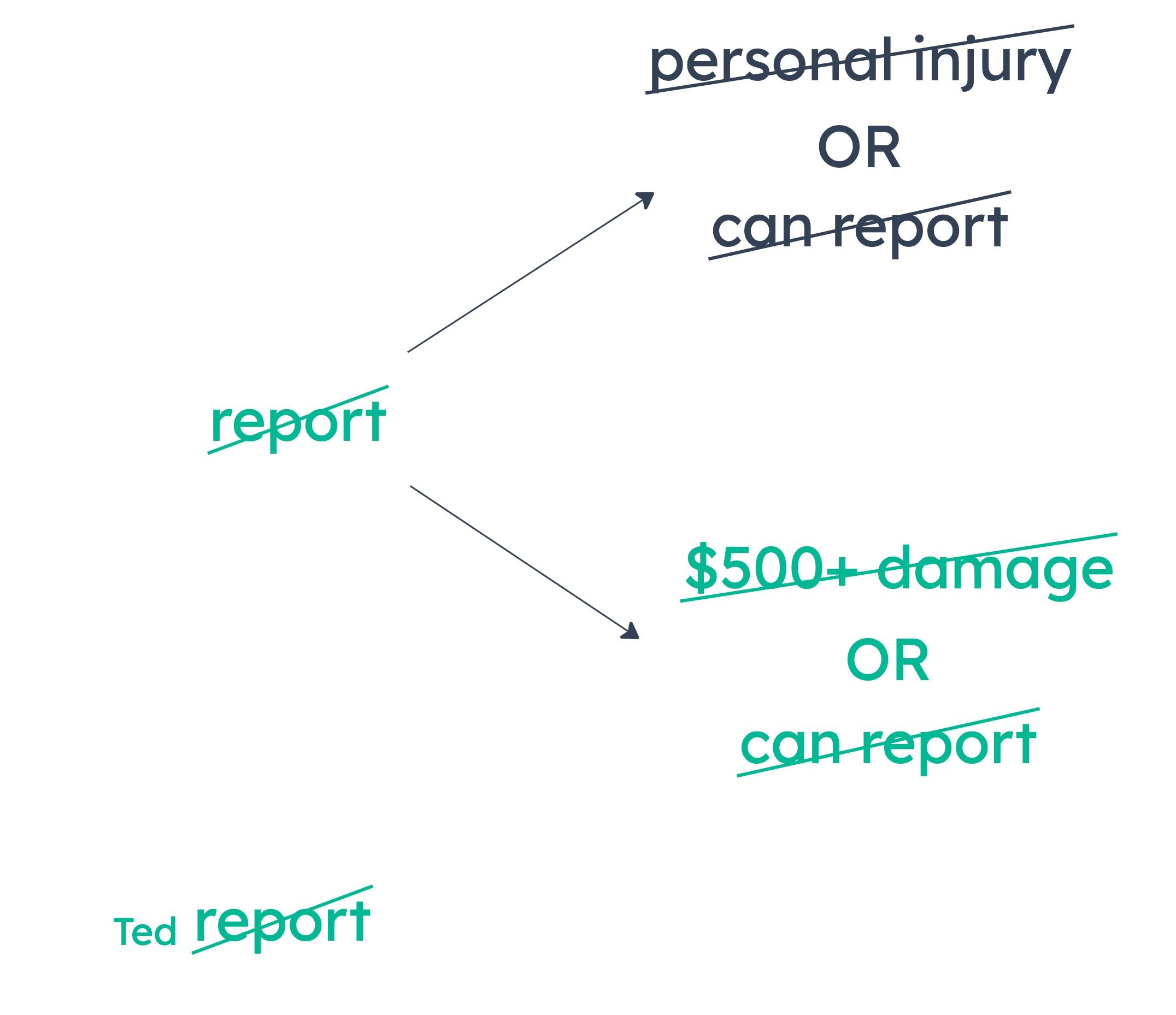Summary
If an accident led to personal injury and the driver can report the accident, then the driver is required to report the accident.
If an accident led to over $500 of property damage and the driver can report the accident, then the driver is required to report the accident.
Ted is not required to report his accident.

If an accident led to over $500 of property damage and the driver can report the accident, then the driver is required to report the accident.
Ted is not required to report his accident.

Very Strongly Supported Conclusions
If Ted is capable of reporting his accident, then the accident didn’t lead to personal injury and it didn’t lead to over $500 of damage.
If the accident led to personal injury or to over $500 of damage, then Ted is incapable of reporting it.
If the accident led to personal injury or to over $500 of damage, then Ted is incapable of reporting it.
A
If Ted is incapable of reporting the accident, then the accident did not lead to property damage exceeding $500.
Unsupported. Like (D), we don’t know what happened if Ted is incapable of reporting the accident; he wouldn’t be required to report it anyway. We only know that if he is capable of reporting it, then it didn’t lead to personal injury and it didn’t lead to over $500 of damage.
B
If Ted’s car was damaged in excess of $500 in the accident, then he is incapable of reporting the accident to the department of motor vehicles.
Very strongly supported. If the accident caused over $500 of property damage and Ted is capable of reporting it, then he’s required to report it. But Ted is not required to report it. So, if it caused over $500 of damage, Ted must be incapable of reporting the accident.

C
Someone other than Ted is legally required to report the accident to the department of motor vehicles.
Unsupported. Just because Ted isn’t required to report the accident doesn’t mean that someone else is. It’s possible that no one needs to report it.
D
If Ted is incapable of reporting the accident to the department of motor vehicles, then he was injured in the accident.
Unsupported. Like (A), we don’t know what happened if Ted is incapable of reporting the accident; he wouldn’t be required to report it anyway. We only know that if he is capable of reporting it, then it didn’t lead to personal injury and it didn’t lead to over $500 of damage.
E
Either no one was injured in the accident or the accident did not lead to property damage exceeding $500.
Unsupported. It’s possible that the accident did cause personally injury and over $500 of property damage but Ted isn’t required to report it because he’s incapable of reporting it.
Summarize Argument: Phenomenon-Hypothesis
The author hypothesizes that dogs are averse to being treated unfairly. This is due to a study where dogs stopped obeying commands when they weren’t rewarded, but when their partner dog was rewarded with a treat.
Notable Assumptions
The author assumes that dogs have a concept of fairness. He also assumes that fairness plays a bigger role in dogs choosing not to follow commands than a simple lack of motivation stemming from the fact there’s no reward.
A
Were dogs who were accustomed to receiving regular rewards prior to the study more inclined to obey the command?
We have no idea if those dogs were the ones receiving treats or not. This tells us nothing about fairness.
B
Is there a decline in obedience if rewards are withheld from both dogs in the pair?
Neither dog received a reward, so the dogs were being treated fairly. If there was a decline in obedience, then it would seem dogs don’t object to unfairness—they just aren’t motivated without treats. If not, then the dogs evidently will obey commands without treats.
C
Were dogs who received treats in one trial ever used as dogs that did not receive treats in other trials?
Irrelevant. Even if those dogs were used twice, the fact would still stand they stopped obeying commands when they didn’t receive a reward. We need to assess the author’s explanation for why this happened.
D
Were there any cases in which the dog who was given a reward became more inclined to obey the command?
Even if there were cases where this happened, we care about the dogs who stopped obeying commands. The author isn’t speculating that dogs can become more motivated by rewards—he’s hypothesizing that dogs are averse to being treated unfairly.
E
How many repetitions were required before the unrewarded dogs began to disobey the command?
We don’t care how long it took for the dog to stop obeying commands. We’re interested in why they stopped obeying commands.